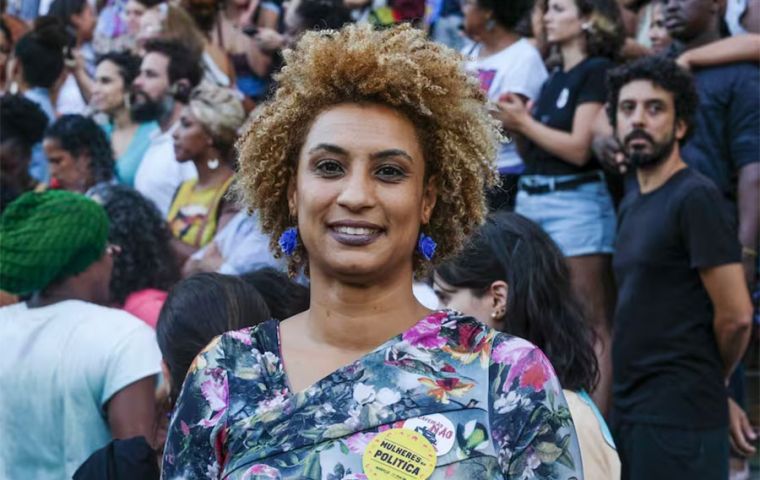MercoPress. South Atlantic News Agency
Brazil: Marielle Franco's murder closer to being solved
 Dino insisted Monday that the “participation of other people” in the crime was “indisputable.”
Dino insisted Monday that the “participation of other people” in the crime was “indisputable.” The 2018 murder of Carioca activist and councilwoman Marielle Franco is closer to being solved, Security Minister Flávio Dino said Monday after one of the two suspects reached a plea agreement and confessed. “New evidence” confirmed the involvement of the two people arrested for the case, ex-cops Ronnie Lessa and Elcio de Queiroz, said Dino, at a press conference in Brasília.
“Because of this evidence collected, we had Elcio's sealed confession. There, he confirms his own participation and the participation of Ronnie Lessa,” said the minister. Accused respectively of firing the shots and driving the car in which they chased the councilwoman out of a work meeting, Lessa and Queiroz were arrested in March 2019 and remained in prison awaiting trial.
Queiroz's confession led the Federal Police to re-arrest former firefighter Maxwell Simoes Correa Monday in Rio de Janeiro. Simoes had already been apprehended for this case in 2020 after being pointed out as the owner of a car used to hide the weapons used in the crime. He was out on probation. Correa had a role in “the surveillance” of Franco and later in the cover-up of the murder, Dino said.
The minister affirmed that the ex-cop's confession closes an initial phase of the investigation related to the execution of the crime and underlined his “hope” that the new elements “will lead to the intellectual authors.”
An Afro-Brazilian, defender of minorities, critic of the police and born in a favela, Franco was shot at least four times in the head and her driver Anderson Gomes three times in the back on March 14, 2018. Franco was 38 years old. A militant of the Socialism and Liberty Party (PSOL, left), Franco strongly defended the rights of young blacks, women, and the LGBTI community. She was also highly critical of police violence in Rio de Janeiro's favelas.
She was the fifth most-voted councilwoman in Rio de Janeiro in the 2016 municipal elections, with more than 46,000 votes. Her figure inspired numerous black women's candidacies at the municipal, state, and even federal levels.
Her sister, Anielle Franco, is the current Minister of Racial Equality in the government of Luiz Inácio Lula da Silva. “I reaffirm my confidence in the conduct of the investigation by the Federal Police and repeat the question I have been asking for 5 years: who had Marielle killed and why?” the minister tweeted.
To thicken the plot, Ronnie Lessa used to live in the same residential complex as then Congressman and future President Jair Bolsonaro, who has always denied any link to the affair and was never involved in the investigation.
Lessa and Queiroz have links to the paramilitary militias that terrorize several slums. These militias, which have former police officers in their ranks, emerged in Rio some two decades ago. Created supposedly to free the favelas from the yoke of drug traffickers, they turned into mafias that demand costly tributes in exchange for “protection.” Their abuses were denounced on several occasions by Franco.
So far, no one has been officially charged as the mastermind of the murder. In March 2019, the Rio Prosecutor's Office hypothesized that it was “indisputable that Marielle Franco was the victim of a summary execution due to her political activity.” On Monday, a prosecutor maintained that line of investigation, although he specified that this “does not exclude other motivations.”
Minister Dino insisted Monday that the “participation of other people” in the crime was “indisputable.”
“New evidence collected indicates that there is a strong link between this homicide and militias and organized crime,” Dino added.
Meanwhile, a Rio de Janeiro court ordered Maxwell Simões Correa to be held in pre-trial detention at a maximum security federal facility “outside the state, since he represents a risk to the investigations,” Agencia Brasil reported.
”[...] for all these reasons I decree, based on the Code of Criminal Procedure, the preventive detention of Maxwell Simões Correa, valid for 20 years for a maximum security federal penal establishment, to be indicated by the National Penitentiary Department (Depen), an organ of the Ministry of Justice”, determined the judge.
Correa would have participated, one day after the crime, in the exchange of license plates of the vehicle used in the murder. He is also believed to have disposed of the casings and ammunition used in the crime, in addition to dismantling the car.




Top Comments
Disclaimer & comment rulesCommenting for this story is now closed.
If you have a Facebook account, become a fan and comment on our Facebook Page!